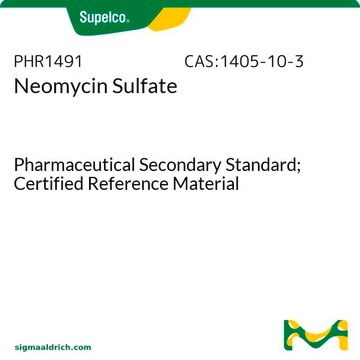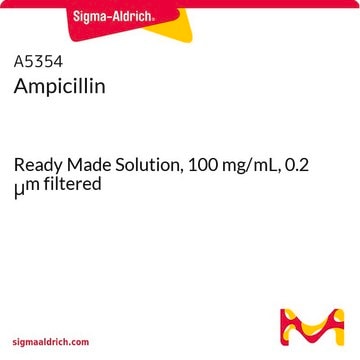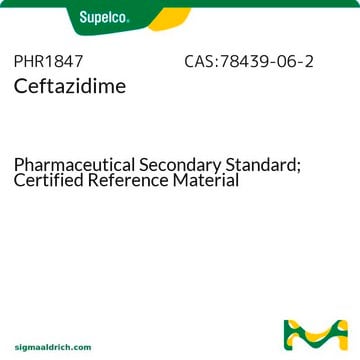PHR1424
Ampicillin Sodium
Pharmaceutical Secondary Standard; Certified Reference Material
Synonym(s):
Ampicillin sodium salt, D-(−)-α-Aminobenzylpenicillin sodium salt
About This Item
Recommended Products
grade
certified reference material
pharmaceutical secondary standard
Quality Level
Agency
traceable to BP 785
traceable to Ph. Eur. A1000000
traceable to USP 1033203
API family
ampicillin
CofA
current certificate can be downloaded
technique(s)
HPLC: suitable
gas chromatography (GC): suitable
mp
215 °C (dec.) (lit.)
application(s)
pharmaceutical (small molecule)
format
neat
storage temp.
2-30°C
SMILES string
[Na+].CC1(C)SC2[C@H](NC(=O)[C@H](N)c3ccccc3)C(=O)N2[C@H]1C([O-])=O
InChI
1S/C16H19N3O4S.Na/c1-16(2)11(15(22)23)19-13(21)10(14(19)24-16)18-12(20)9(17)8-6-4-3-5-7-8;/h3-7,9-11,14H,17H2,1-2H3,(H,18,20)(H,22,23);/q;+1/p-1/t9-,10-,11+,14-;/m1./s1
InChI key
KLOHDWPABZXLGI-YWUHCJSESA-M
Looking for similar products? Visit Product Comparison Guide
General description
Application
Biochem/physiol Actions
Mode of Resistance: Administration with ß-lactamase cleaves the ß-lactam ring of Ampicillin and inactivates it.
Antimicrobial Spectrum: Includes both gram-positive (similar to benzylpenicillin) and gram-negative bacteria (similar to tetracyclines and chloramphenicol.
Analysis Note
Other Notes
Footnote
related product
Signal Word
Danger
Hazard Statements
Precautionary Statements
Hazard Classifications
Resp. Sens. 1 - Skin Sens. 1
Storage Class Code
11 - Combustible Solids
WGK
WGK 2
Flash Point(F)
Not applicable
Flash Point(C)
Not applicable
Choose from one of the most recent versions:
Already Own This Product?
Find documentation for the products that you have recently purchased in the Document Library.
Customers Also Viewed
Our team of scientists has experience in all areas of research including Life Science, Material Science, Chemical Synthesis, Chromatography, Analytical and many others.
Contact Technical Service







